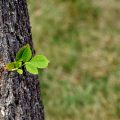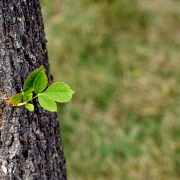Plastic for the bio bin
Disposing of biowaste sustainably with biopolymers – is that possible? Yes, it is possible! It is the most sustainable solution for food packaging in many cases.
Food packaging is useful, necessary, and, above all, there to protect the contents. The downside: after use, many packages are not recyclable or are difficult to recycle. This is because they consist of several materials, but also because they are contaminated by food.
Global warming, as well as pollution of the environment, are central issues of sustainability. The use of plastic in packaging is frowned upon today, but a differentiated approach is necessary.
One of the world’s leading companies of bio-based, sustainable biopolymers for compostable materials is BIOTEC. We spoke to Managing Director Stefan Barot.

Mr. Barot, where do you see the central problem in terms of packaging?
The fundamental problem with food packaging is its disposal. We have to answer two questions about sustainability:
1. when is packaging necessary and
2. what is the most sustainable packaging.
What do you mean by that?
Food packaging should only be used if we use it to reduce greenhouse gases. In 2016, global food production was responsible for 26% of greenhouse gas emissions, less than 1% for its packaging*1. 6% of all global greenhouse gas emissions were caused by spoiled food. Conclusion: Whenever packaging extends the shelf life of food, it is sustainable, whether it is made of paper, glass, or plastic.
In order to answer the question of the most sustainable packaging, the functionality and waste disposal of this packaging must be reconciled. Experts agree: no waste should be landfilled or incinerated; waste can only be recycled or composted sustainably.
When should packaging be recycled and when should it be composted?
This depends mainly on the content of the packaging. A good example, the compostable bin liner:1 kg of bin liner allows 800 kg of kitchen waste to be converted into 300 kg of nutrient-rich compost. Coffee capsules and tea bags made of compostable materials have also been introduced abroad.
When recycling packaging, the issues are: loss of quality and energy consumption. Glass, aluminum, and steel packaging can be recycled often, but the production, transport, and recycling require a relatively large amount of energy. Plastic and paper can also be recycled, but not as often as desired because they degrade during recycling.
What could be improved in Germany?
If we look at household waste, we first have to remove the biomass. This is already working quite well in Germany. However, 5 million tons of biomass were still burned in 2019, which doesn’t make sense, but is a political problem, because we import waste from abroad to fill our incinerators.
What do you expect from politics in terms of packaging?
A clear overall concept: this is what the system will look like in 10 years! During the conception of an article, its disposal must already be determined, waste landfilling and incineration could therefore be reduced. The respective disposal solution – i.e., recycling or composting – should be marked on each article for the consumer. In this way, consumers are involved in the concerns of our environment when making their purchasing decisions.
„The fundamental problem with food packaging is its disposal.“
Stefan Barot
What specifically do you propose?
Biomass should be composted wherever possible. This organic recycling helps the environment to strengthen soils and return organic carbon to nature as a kind of fertilizer. This also helps residual waste because it can be recycled more easily.
What exactly happens in organic recycling? And what role do your products, BIOPLAST, play in it?
Organic recycling, i.e., composting, biopolymers that consist entirely or partly of renewable raw materials break down in industrial or domestic compost. A classic industrial composting cycle takes about 6 – 12 weeks.
Our biopolymer bags integrate fully into this process and are therefore an optimal disposal solution for organic waste. They allow not only food waste, but also packaging contaminated with food waste to be sent for composting.
Can you tell us a few more facts about your company? Where is it heading?
BIOTEC was founded in 1992 and has grown rapidly since then. We have unique know-how in the composition and degradation of biopolymers. Together with our customers, we already think about the sustainable disposal of a product during its development. We challenge our partners to work together to achieve ambitious goals in the circular economy.
Hier geht es zur deutschen Version des Interviews: https://www.trendreport.de/plastik-fur-die-biotonne
*1 Our World in Data (https://ourworldindata.org/food-ghg-emissions)
Aufmacherbild / Quelle / Lizenz
Photo by Marcell Viragh on Unsplash













Kommentare sind deaktiviert.